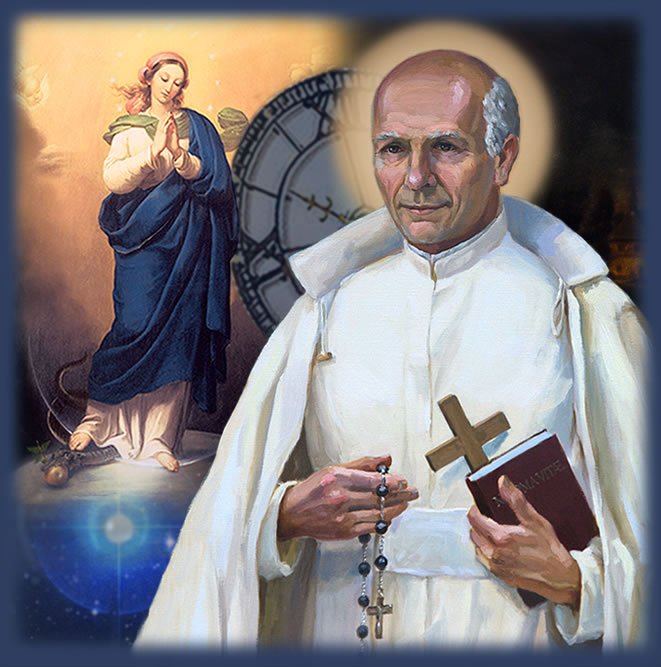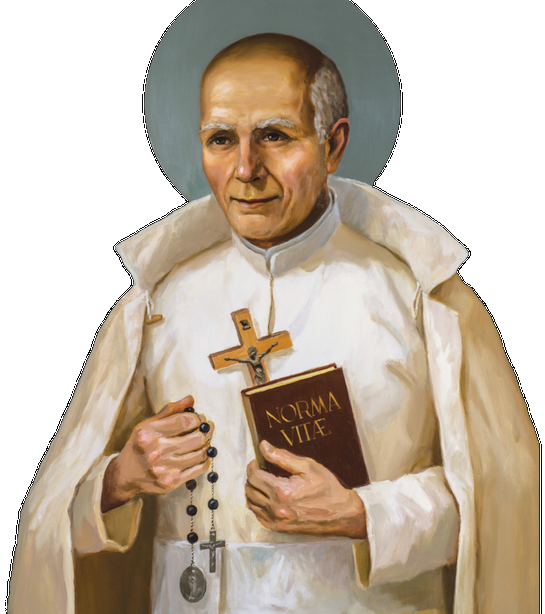How to follow Jesus Christ? How to become his true disciple? We can see it in many diffirent saints. Less or more they were all the same. They did not lack of the crosses: the denials, the humiliations, the sufferings. Because their own teacher, Jesus Christ, also set an example for them. they tasted the same taste with him. Our father founder, Saint Stanislaus Jesus and Mary Papczyski, was one of them. He was not a renowned saint, but was a small saint among the saints in the Church. But for me, the one who lives in his house, often listens to his name, is nourished by his teachings every day. I feel the familiarity between me and him: I am like his son and he is like my father, a spiritual father. How could I not love him? His image seems to be rooted in my mind. I saw his love for Jesus and B.V.M very great. It was like a fire always burning in his heart. And sometimes I feel like I was also caught by that fire. even though it was short, it left me the experience of that heat, the heat of faith and love. It is difficult to describe. But it didn’t stay long in me because I am still wet inside. my heart is still a hard-hearted to keep that fire. Even so, I still desire for that fire. By imitating his way of life through chastity, poverty, and obedience, I may be worthy to be his spiritual son in this congregation, the Marian Fathers of the Immaculate Conception of the most Blessed Virgin Mary.

First, we can see his love for chastity. Through his life we see that he taught nothing else but to teach us how to love Jesus and his mother deeply.That is the vow of chastity, a pure love for them. What is the pure love? It is giving everything without keeping anything for itself. That love is the foundation. From that foundation, Our Father Founder built his thoughts, words, and actions into a stable house that, even in storms, did not collapse. (Mt 7:25) He gave his totality life for Jesus Christ and Blessed Virgin Mary as his name which he bore. He completed the house as a palace worthy of God’s indwelling. I also want to build my vocation on that foundation. It is a pure love for Jesus Christ and Blessed Virgin Mary. But, what kind of love I have? Honestly, I have not really loved Jesus and His Mother with all my heart. My heart is still a division. It is divided into pieces, one part for the Lord, one for my own will, another for my family, for my culture… This is like I want to follow Jesus and at the same time, I also want to follow the world. But if I really want to follow Jesus, I have to sell everything, so that I may follow him. Because with the Lord, there is everything or nothing.
Second, the virtue of poverty. From the beginning of the religious life, maybe this virtue was the attraction for him that, after four years at the Jesuit college, he returned to Podoliniec to join the Piarist. Because he had the opportunity to observe the life of the Piarist priests: their love of poverty, piety and unselfish dedication to the education of youth. Indeed, his desire was not to seek an easy, comfortable life, but to seek the way leading to perfection. And when the other members of the Piarist wanted to soften the constitution of the order, what did he do? Isn’t it “Zeal for Your house will consume me”! (John 2:17) How much suffering he had to bear, how much bitterness he had to endure. It is not easy to describe the cross he had to carry at that time. but through those sufferings, he tasted the taste of love. It was like bitter medicine in his mouth, but when swallowed, it turned into sweetness. And me, I say I want to follow Jesus, but if in reality I lack nothing, I am a liar. Practicing the virtue of poverty will help me to follow Jesus. it will make me separated from the world. Moreover, to have the Christian faith, I not only have to give up my old way of life, but I could also become a stranger in my own family, a traitor to my country. Am I brave enough to live this way of life? With my strength this is impossible, but with God’s help, I believe that I could transform my heart, so that I may become his true disciple, as father founder himself did.
Third, the obedience. Surely, this virtue was not easy for him. As a teenager, he preferred to follow his own will rather than listen to others. With this disobedience, he faced a difficult time in Lvov, what Father Cazimir wyszisky called “the cross of Lvow”.[1] he learned obedience from what he suffered (x. Hebrews 5,8). From those experiences, He humbly changed his life. he entrusted his life in the hands of God. He sought, listened to and obeyed the will of God through his superiors, bishops and pious spiritual directors. And as we know the will of God always is not easy. He accepted it out of love for Jesus and Blessed Virgin Mary. he also paid great attention to the virtue of obedience, so that he did not cease to correct his spiritual children, not let them to stray from the way of perfection. obey him, me too, I need to die for my own will, accept correction of father superior, put my life in the direction of God through my superior. By doing so, I will have peace in my heart and free to follow Jesus Christ.
Practicing the evangelical counsels means following Jesus Christ, on the path he passed. It was professed by our father founder through the Oblatio. through this vow, we saw his zeal for the Gospel. and through his life we saw his faithfulness to his Oblatio. he offered his life out of love for Jesus and B.V.M. he is truly an example for me in consecrated life.
Living in this local Church, the Church in Vietnam, where the faith is deformed by the pagan culture, it is difficult for Christian to catch the pearl of truth, a true faith. I believed that God must have loved me much, that’s why he brought me here, this congregation, through the example of the Founder Father, through the charism of congregation (It is the Christian Faith), I may realize my reality. Then I may repent and change my way of life, to be truly worthy a spiritual son of Father founder, and through him I may become a true disciple of Jesus Christ and the son of the Blessed Virgin Mary.
Tập sinh: Phêrô Nguyễn Văn Thăng
![]()

